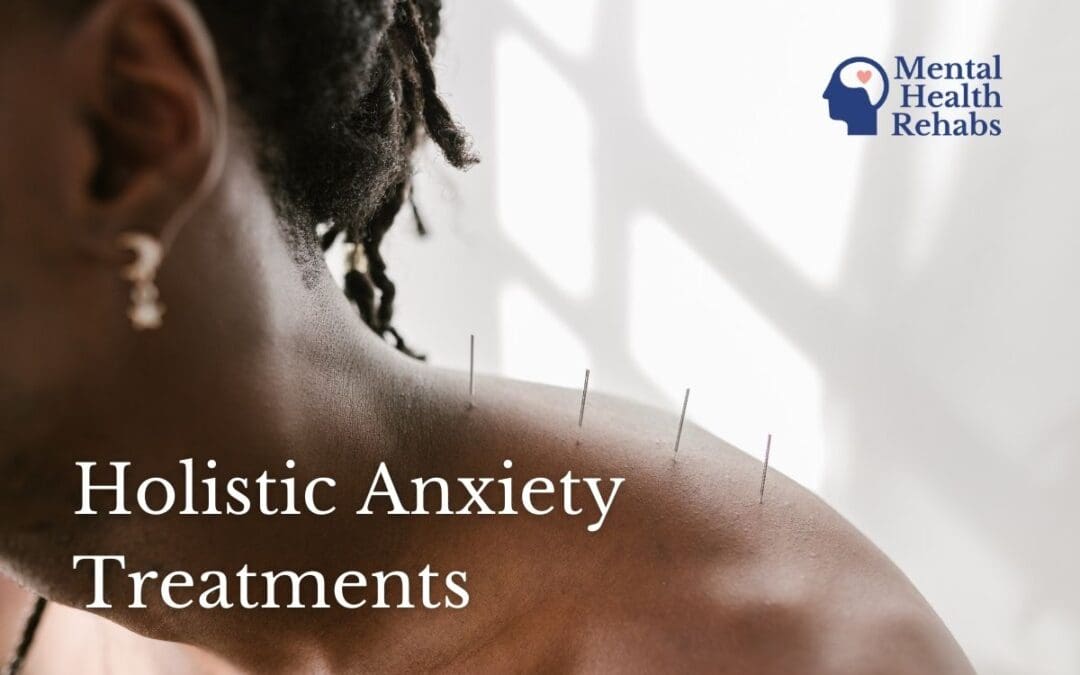Anxiety is one of the most common mental illnesses among Americans, affecting over a third of adults at some point in their lives. Prescription drugs like benzodiazepines are effective and fast-acting which has made them a popular solution that’s frequently prescribed by primary care physicians — but their efficacy comes with risks. Benzos are associated with higher mortality for at-risk individuals, as well as other acute health risks like respiratory suppression and lung disease, overdose death, cancer risk, and worsening of sleep apnea.
This, plus a growing cultural shift towards natural products and lifestyles, has led to a growing interest in holistic treatment for anxiety. These encompass a broad range of approaches that consider the physical, mental, emotional, and spiritual aspects of well-being while still addressing the specific ailment.
9 Holistic Treatments for Anxiety
Treating anxiety in a holistic way means doing so in a way that promotes balance, harmony, and overall wellness. These nine suggestions offer natural anxiety relief solutions that can both reduce anxiety in the moment while also improving emotional resilience and self-awareness in the long run.
Aromatherapy
Essential oils can be used to promote relaxation and reduce anxiety. Scents like lavender, chamomile, and bergamot have calming properties. They can be diffused in the air, applied topically (after dilution), or added to baths for their potential therapeutic effects.
Acupuncture
Acupuncture, a traditional Chinese medicine practice, is the insertion of thin needles into specific points on the body to focus and balance a person’s “chi” or life force. Western medicine shows that acupuncture stimulates the central nervous system which can trigger the release of chemicals that stimulates healing in the brain and body. Some studies suggest that acupuncture may be effective in reducing anxiety and depression symptoms, but more research is needed.
Dietary Modifications
Most people don’t realize the influence the gut has on the brain. About 95% of our body’s serotonin receptors are found in the gut lining. That’s why dietary changes can have such a major impact on mental health.
Omega-3 fatty acids found in fish, flaxseeds, and walnuts have been linked to improved mood. Zinc and magnesium-rich foods make people feel calmer; asparagus extract is used in China for its anti-anxiety properties; and a recent study found that probiotics have an anxiolytic effect that reduces anxiety symptoms.
You can also benefit by removing certain foods from your diet such as excessive caffeine and alcohol, which can trigger the body’s stress response and affect how the brain processes emotions.
Drink Tea
Tea has been a part of herbal remedies for centuries. Western medicine has recently looked into this ancient practice and found real science-backed benefits. Many teas contain an amino acid called L-theanine which increases the production of calming neurotransmitters like serotonin and dopamine. This can help induce a sense of calmness without causing drowsiness and is an easy anxiety treatment at home.
Exercise and Physical Activity
Regular exercise has long been known to have a positive impact on mental health. Even mild exercise can release endorphins, reduce stress hormones, and improve mood. Aim for at least 30 minutes of moderate exercise most days of the week.
Herbal Supplements
There are many natural supplements for anxiety and depression. Examples include St. John’s Wort for mild to moderate depression, passionflower for anxiety, and lavender for relaxation. However, it’s important to consult with a healthcare professional before starting any herbal supplements, as they may interact with medications or have side effects.
Mindfulness and Meditation
If you’re looking for an easy anxiety treatment at home, practicing mindfulness with meditation can be done without any equipment, at any place, any time. Various techniques, such as deep breathing exercises and guided imagery can help reduce anxiety and depression symptoms by promoting relaxation, improving self-awareness, and fostering a sense of calmness.
Sleep Hygiene
Prioritizing good sleep hygiene can significantly impact mental health. Maintaining a regular sleep schedule, creating a comfortable sleep environment, and limiting screen time or other stimulants before bedtime can improve sleep quality, thereby reducing anxiety and depression symptoms.
Social Support and Therapy
Seeking social support through trusted friends, family, or support groups can provide emotional comfort and understanding. It’s also important for living a long, happy life as research has proven that loneliness and isolation can have the same health risks as obesity and smoking. exploring therapeutic options like cognitive-behavioral therapy (CBT), counseling, or psychotherapy can help address the root causes of anxiety and depression and develop effective coping strategies.
Consult with a mental health provider before implementing any natural or holistic treatments for anxiety, especially if you have underlying medical conditions or are taking medications. Personalized guidance will ensure these approaches align with your specific needs and circumstances.

